Motivational Letter For Learnership
[Your Name]
[Your Address]
[City, State, ZIP Code]
[Email Address]
[Phone Number]
[Date]
[Company/Organization Name]
[Contact Person's Name]
[Job Title]
[Address]
[City, State, ZIP Code]
Dear [Contact Person's Name],
Subject: Motivational Letter for Learnership Program
I am writing to express my sincere interest in the learnership program offered by your esteemed organization. I have long admired the exceptional work you do in [mention the industry or field the company is involved in], and I am eager to contribute my skills, knowledge, and passion to your team.
From a young age, I have been captivated by [mention the field or industry] and have consistently pursued opportunities to enhance my understanding and expertise in this area. Throughout my academic journey and extracurricular activities, I have demonstrated a relentless commitment to personal growth, innovation, and professional development.
As I researched potential learnership opportunities, your organization stood out to me as a perfect match for my aspirations. Your company's reputation for fostering a dynamic learning environment and dedication to nurturing young talent aligns closely with my career goals. I firmly believe that participating in your learnership program will provide the ideal platform to enhance my skills, gain invaluable practical experience, and propel my career in the right direction.
During my academic tenure, I have excelled in courses related to [mention relevant subjects], which have equipped me with a strong foundation in both theory and practical application. Additionally, I have been involved in various projects and internships, honing my problem-solving abilities, teamwork, and adaptability to diverse challenges.
What sets me apart is my unwavering determination to continuously learn and grow, my passion for innovative solutions, and my commitment to making a positive impact on the industry. I am an enthusiastic learner with an open mind, always seeking new ways to improve and evolve.
Furthermore, I possess strong interpersonal skills, which enable me to collaborate effectively with diverse teams, communicate ideas clearly, and build lasting relationships with colleagues and clients alike. I am confident that my combination of technical expertise and soft skills would be an asset to your organization.
Your learnership program is not merely an opportunity for professional advancement; it is a chance for personal growth and development, which is equally significant to me. I am eager to learn from the best in the industry and contribute my dedication, creativity, and hard work to your team.
Thank you for considering my application for the learnership program. I am excited about the prospect of joining your organization and contributing to its continued success. I am more than willing to provide any additional information or references upon request.
Looking forward to the possibility of becoming a part of your organization, I would be grateful for the chance to discuss my application further in an interview.
Yours sincerely,
[Your Name]
Entry-Level Learnership Application Letter
Subject: Application for [Learnership Program Name]
Dear [Hiring Manager/Program Coordinator Name],
I am writing to express my strong interest in the [specific learnership program] advertised on [where you found it]. As a recent [graduate/school leaver] with a passion for [industry/field], I am eager to gain practical experience while developing professional skills in a structured learning environment.
Throughout my academic journey, I have maintained a keen interest in [relevant subject/field]. My studies in [subjects/qualifications] have provided me with foundational knowledge that I am enthusiastic to apply in a real-world setting. I am particularly drawn to this learnership because it offers the perfect blend of theoretical learning and hands-on experience.
I am a dedicated and quick learner who thrives in collaborative environments. My strengths include [list 2-3 relevant skills], and I am committed to contributing positively to your team while absorbing as much knowledge as possible. I understand that this learnership will be challenging, but I am prepared to invest the time and effort required to excel.
The opportunity to learn from experienced professionals at [Company Name] while earning a recognized qualification aligns perfectly with my career aspirations. I am confident that my enthusiasm, work ethic, and willingness to learn make me an ideal candidate for this program.
I have attached my CV, academic transcripts, and relevant certificates for your consideration. I would welcome the opportunity to discuss my application further in an interview.
Thank you for considering my application. I look forward to hearing from you.
Yours sincerely,
[Your Full Name]
[Contact Number]
[Email Address]
Career Change Learnership Motivation Letter
Subject: Learnership Application - Career Transition to [Field]
Dear [Program Coordinator],
I am writing to apply for the [learnership program name] as I seek to transition my career into [new industry/field]. After [number] years working in [current/previous field], I have realized my true passion lies in [new field], and I am committed to making this career change through structured training and development.
My professional background in [previous field] has equipped me with valuable transferable skills including [list relevant skills such as problem-solving, communication, project management]. While these experiences have been rewarding, I have consistently found myself drawn to [aspects of new field], which has motivated me to pursue formal training in this area.
I have already taken proactive steps toward this transition by [mention any courses, self-study, volunteering, or relevant activities]. This learnership represents the ideal opportunity to formalize my knowledge, gain industry-recognized qualifications, and develop practical competencies under expert guidance.
What sets me apart is my maturity, life experience, and genuine commitment to this career path. I am not entering this field on a whim – I have carefully considered this decision and am prepared for the challenges ahead. My previous work experience has taught me discipline, accountability, and the value of continuous learning.
I am particularly impressed by [Company Name]'s reputation for [mention specific aspects], and I believe this learnership will provide the comprehensive foundation I need to build a successful career in [new field]. I am fully committed to dedicating myself to both the academic and practical components of the program.
I would appreciate the opportunity to discuss how my unique background and determined mindset would benefit your learnership cohort.
Thank you for considering my application.
Kind regards,
[Your Full Name]
[Contact Details]
Financially Disadvantaged Background Learnership Letter
Subject: Application for [Learnership Program] - Financial Need Candidate
Dear Selection Committee,
I am writing to apply for the [learnership program name] with sincere hope and determination. Coming from a financially disadvantaged background, this learnership represents more than just a training opportunity – it is a potential turning point in my life and my family's future.
I completed my [qualification] at [institution] despite significant financial constraints. My family's economic situation has made it impossible to pursue further education through traditional routes, and I have been unable to secure employment without the practical skills and workplace experience that employers require. This learnership offers the structured pathway I desperately need to break this cycle.
Despite these challenges, I have remained focused and motivated. I have [mention any volunteer work, community involvement, or self-improvement efforts]. These experiences have taught me resilience, resourcefulness, and the value of every opportunity. I do not take this application lightly – I understand the privilege of being selected and am prepared to work harder than ever to prove myself worthy.
I am drawn to [field/industry] because [explain genuine interest]. The fact that this learnership provides both training and a stipend means I can support my family while building a foundation for long-term career success. This is exactly the opportunity I need to transform my circumstances through dedication and hard work.
I possess strong [relevant skills/qualities], and while my CV may not be as extensive as other candidates, my drive and commitment are unmatched. I am willing to go above and beyond in every aspect of this program. I view challenges as opportunities to grow and am not afraid of hard work.
I humbly request your consideration for this life-changing opportunity. I am ready to prove that investing in my development will yield excellent returns.
Thank you for your time and consideration.
Respectfully,
[Your Full Name]
[Contact Information]
Specialized Technical Learnership Application Letter
Subject: Application for [Technical Learnership Program]
Dear [Hiring Manager],
I am writing to apply for the [specific technical learnership] at [Company Name]. With a strong foundation in [relevant technical area] and hands-on experience through [projects/studies], I am excited about the prospect of developing specialized skills in [technical field] through your comprehensive program.
My technical journey began with [describe introduction to field], which sparked a lasting fascination with [technical area]. I have since completed [relevant qualifications/courses] and have independently worked on projects including [briefly describe 1-2 relevant projects]. These experiences have given me practical exposure to [technical skills/tools], but I recognize the need for structured professional training to reach industry standards.
I am particularly interested in [specific technical aspects of the learnership] because [explain why]. The curriculum's focus on [mention specific technical components] aligns perfectly with my career goals of becoming a [specific technical role]. I have researched your company's work on [mention relevant projects/technologies], and I am eager to contribute to such innovative initiatives.
My technical competencies include [list specific technical skills, software, tools, or methodologies]. I am comfortable with [technical environments/systems] and have a proven ability to troubleshoot [relevant technical challenges]. Beyond technical skills, I bring strong analytical thinking, attention to detail, and a systematic approach to problem-solving.
I thrive in environments that challenge me to continuously upgrade my skills. The combination of theoretical learning, practical application, and mentorship that your learnership offers is exactly what I need to transition from enthusiastic learner to competent professional.
I have attached my CV, portfolio of technical projects, and academic records. I would welcome the opportunity to discuss my technical background and demonstrate my capabilities in an interview or practical assessment.
Thank you for considering my application.
Best regards,
[Your Full Name]
[Email and Phone]
Previously Unemployed Graduate Learnership Letter
Subject: Learnership Application - Unemployed Graduate Seeking Opportunity
Dear [Program Manager],
I am writing to apply for the [learnership program name] as an unemployed graduate seeking to break into the professional workforce. I graduated with [qualification] in [year] from [institution], but despite numerous job applications, I have struggled to secure employment due to the common requirement for "prior work experience."
This cycle of needing experience to get a job, but needing a job to gain experience, has been incredibly frustrating. However, I have not allowed this setback to diminish my ambition or work ethic. During my unemployment period, I have [mention activities such as online courses, volunteer work, freelance projects, or skills development]. These efforts demonstrate my commitment to staying productive and continuously improving myself.
Your learnership program offers exactly what I need: a structured opportunity to gain recognized qualifications and practical workplace experience simultaneously. I am not looking for just any job – I am seeking a foundation upon which to build a meaningful career in [field/industry].
My academic achievements include [mention relevant accomplishments, grades, or projects]. I possess strong [list relevant skills] and am known for my [personal qualities such as reliability, enthusiasm, adaptability]. What I lack in professional experience, I more than compensate for with my eagerness to learn, fresh perspective, and unwavering dedication.
I understand that being selected for this learnership is highly competitive, but I believe my academic background, combined with my hunger for opportunity and proven self-motivation during unemployment, makes me a candidate worth investing in. I am ready to commit fully to this program and prove my value.
I am available for an interview at your earliest convenience and am flexible regarding start dates and program requirements.
Thank you for considering my application and for offering programs that provide pathways for graduates like myself.
Sincerely,
[Your Full Name]
[Contact Details]
Internal Employee Learnership Transfer Letter
Subject: Internal Application for [Learnership Program]
Dear [Manager/HR Manager],
I am writing to formally express my interest in the [learnership program name] currently being offered within our organization. As a current employee in the [department] for [duration], I have developed a strong interest in [new field/department] and believe this learnership would enable me to contribute more effectively to the company while advancing my career development.
During my time in [current role], I have consistently demonstrated [mention achievements, skills, or qualities]. However, I have always been drawn to [area of learnership], and I have taken the initiative to [mention any self-learning, shadowing, or relevant activities]. This learnership would provide the formal training and qualification I need to transition into this field professionally.
I believe my existing knowledge of company culture, policies, and operations gives me a unique advantage. I already understand how [Company Name] operates, which would allow me to focus entirely on acquiring the technical skills and knowledge specific to [learnership field]. This means I could potentially add value more quickly than external candidates who would need time to acclimate to the organization.
My current supervisor, [Name], is aware of my application and has provided support for this career development move. I have ensured that my current responsibilities are well-documented and that a smooth transition plan is in place should my application be successful.
I am committed to excelling in this learnership while maintaining the high standards I have established in my current role. I view this as an opportunity to deepen my value to the organization and build a long-term career here across different functional areas.
I would appreciate the opportunity to discuss this application with you and explore how my internal knowledge and proven work ethic align with the learnership requirements.
Thank you for considering my internal application.
Best regards,
[Your Full Name]
[Employee ID]
[Current Department]
[Extension/Email]
Young Person with Dependents Learnership Letter
Subject: Learnership Application - Candidate with Family Responsibilities
Dear [Selection Panel],
I am applying for the [learnership program name] as a young person with family responsibilities who is determined to build a stable career and better future for my dependents. At [age], I am [parent/caregiver] to [briefly mention dependents], which has taught me maturity, responsibility, and time management far beyond my years.
While many people my age may have had the luxury of exploring different paths or taking time to "find themselves," my circumstances have required me to be focused and pragmatic from an early age. I take my responsibilities seriously, and I am applying for this learnership because I need to develop marketable skills that will enable me to provide long-term financial stability for my family.
I have completed my [qualification] while managing family responsibilities, which required exceptional organizational skills and dedication. I am accustomed to balancing multiple priorities, meeting deadlines under pressure, and maintaining commitment even when circumstances are challenging. These are exactly the qualities needed to succeed in both the learnership and the workplace.
The field of [industry/area] appeals to me because [explain interest], and I have researched the career prospects and growth potential. I am not approaching this casually – I have carefully considered how this path aligns with my need for stable employment and career advancement opportunities.
I want to be transparent about my circumstances because they are relevant to my application. My family responsibilities mean I cannot afford to fail or give anything less than my absolute best effort. I have arranged reliable childcare/support systems to ensure my commitments do not interfere with the learnership requirements. I am fully prepared to meet all attendance, punctuality, and performance expectations.
I am asking for an opportunity to prove that my life circumstances have made me stronger, more focused, and more determined than many candidates without such responsibilities.
Thank you for your consideration.
Yours faithfully,
[Your Full Name]
[Contact Information]
What is a Motivational Letter for Learnership and Why is it Important
A motivational letter for learnership is a formal written document that accompanies your application to a learnership program, explaining why you are interested in the opportunity, what makes you suitable, and how the learnership aligns with your career goals. Unlike a standard cover letter, it emphasizes your motivation, commitment to learning, and potential for growth rather than extensive work experience.
The purpose is multi-faceted:
- Differentiate yourself from other applicants who may have similar qualifications
- Demonstrate genuine interest in the specific learnership and organization
- Explain circumstances that may not be evident from your CV alone
- Showcase communication skills and professionalism
- Provide context for any gaps or unusual aspects of your application
- Express commitment to completing the program successfully
- Connect your background to the learnership requirements in a narrative format
Who Should Write and Send a Learnership Motivational Letter
- School leavers seeking their first structured training opportunity
- Unemployed graduates struggling to enter the job market
- Career changers looking to transition into new industries
- Previously disadvantaged individuals seeking skills development opportunities
- Current employees applying for internal learnership programs
- Young parents or caregivers balancing family responsibilities with career development
- Technical enthusiasts with self-taught skills seeking formal qualifications
- Individuals with interrupted education returning to structured learning
- People from rural areas seeking urban professional opportunities
- Anyone applying to SETA-registered learnerships requiring formal applications
Elements and Structure of a Learnership Motivational Letter
Opening Section
- Subject line clearly stating the learnership position
- Appropriate greeting using recipient's name when possible
- Clear statement of intent in the first paragraph
- Mention where you found the learnership advertisement
Body Paragraphs
- Background paragraph: Your current situation, qualifications, and relevant experience
- Motivation paragraph: Why you're interested in this specific learnership and field
- Suitability paragraph: Your skills, qualities, and what makes you a good fit
- Value proposition: What you'll contribute and how you'll benefit from the program
- Unique circumstances: Any context that strengthens your application
Closing Section
- Reference to attached documents (CV, certificates, transcripts)
- Request for interview or further discussion
- Appreciation for consideration
- Professional sign-off with full contact details
- Clear, legible signature (for printed letters)
Attachments to Include
- Updated CV or resume
- Certified copies of academic qualifications
- Identity document copy
- Recent passport-sized photograph
- Reference letters (if available)
- Portfolio or project samples (for technical learnerships)
When Should You Send a Learnership Motivational Letter
- When advertised positions open: As soon as you see a relevant learnership advertisement
- Before application deadlines: Ideally 1-2 weeks before closing date to show eagerness
- During recruitment drives: When companies or SETAs conduct mass recruitment campaigns
- At career fairs: Follow up after initial contact at career events
- When internal opportunities arise: As soon as your company announces learnership programs
- After informational interviews: When contacts suggest you apply for upcoming programs
- During designated intake periods: Many learnerships have specific annual intake cycles
- Upon graduation: When transitioning from education to workforce entry programs
- After skills assessment: When advised by career counselors to pursue specific learnerships
- During economic initiatives: When government or private sector launches youth employment programs
Requirements and Prerequisites Before Writing Your Letter
Research Requirements
- Understand the specific learnership program structure and duration
- Research the company or training provider's values and culture
- Know the industry requirements and career pathways
- Identify the SETA (Sector Education and Training Authority) involved
- Review the job description and required competencies thoroughly
Document Preparation
- Gather all academic certificates and transcripts
- Obtain certified copies of required documents
- Prepare an updated CV tailored to the learnership
- Collect reference contact information
- Compile any relevant project work or portfolios
Personal Preparation
- Clarify your genuine motivations and career goals
- Identify specific aspects of the learnership that appeal to you
- Prepare examples of relevant skills or experiences
- Consider potential challenges and how you'll address them
- Ensure you meet minimum eligibility criteria (age, qualifications, citizenship)
How to Write an Effective Learnership Motivational Letter
Planning Phase
- Read the learnership advertisement multiple times to understand requirements
- Make notes on how your background matches each requirement
- Identify your unique selling points and what differentiates you
- Decide which tone best suits the organization (formal corporate vs. entrepreneurial startup)
Writing Process
- Start with a compelling opening that captures attention immediately
- Use specific examples rather than generic statements about being "hardworking"
- Connect your past experiences (academic, volunteer, personal) to learnership requirements
- Address any potential concerns proactively (gaps in education, lack of experience)
- Show knowledge of the company and explain why you chose them specifically
- Express genuine enthusiasm without sounding desperate
- Keep language clear, concise, and professional
- Maintain appropriate length (one page or 300-500 words)
Review and Refinement
- Check for spelling and grammatical errors multiple times
- Read aloud to catch awkward phrasing
- Verify all names, titles, and company information are correct
- Ensure consistency with information in your CV
- Have someone else review it for clarity and impact
- Save in appropriate format (PDF preferred for email submissions)
Formatting Guidelines for Learnership Motivational Letters
Length and Structure
- Keep to one page (300-500 words maximum)
- Use 4-6 paragraphs with clear topic sentences
- Single spacing within paragraphs, double spacing between them
- Avoid overly long paragraphs (5-7 sentences maximum)
Professional Presentation
- Use standard business letter format for printed letters
- Choose professional fonts (Arial, Calibri, Times New Roman, 11-12pt)
- Maintain consistent margins (1 inch or 2.5cm all around)
- Include proper header with your contact information for printed versions
- Use professional email addresses for digital submissions
- Name files appropriately: "Motivational_Letter_YourName_LearnershipTitle.pdf"
Tone and Style
- Maintain professional yet personable tone
- Use active voice rather than passive constructions
- Be confident but not arrogant
- Show enthusiasm without excessive exclamation marks
- Avoid slang, texting abbreviations, or overly casual language
- Balance humility with confidence in your abilities
- Use industry-appropriate terminology to show familiarity with the field
To Whom Should You Address Your Learnership Letter
Specific Recipients
- HR Manager or Recruitment Officer: For general corporate learnerships
- Learnership Coordinator: When a specific program coordinator is named
- Department Head: For specialized technical learnerships
- Training and Development Manager: In organizations with dedicated training departments
- SETA Representative: For SETA-managed programs
- Program Director: In educational institutions offering learnerships
When Recipient is Unknown
- Call the organization to ask for the appropriate person's name and title
- Check the company website for organizational structure
- Use "Dear Hiring Manager" or "Dear Selection Committee" as last resort
- Address to "Dear Sir/Madam" only if absolutely no other option exists
- Never use "To Whom It May Concern" as it appears impersonal and outdated
Multiple Recipients
- If addressing a panel, use "Dear Selection Committee" or "Dear Selection Panel"
- For SETA programs, you may need to address both the SETA and the employer
- When uncertain, address the most senior person mentioned in the advertisement
What to Do After Sending Your Learnership Motivational Letter
Immediate Follow-up (24-48 hours)
- Confirm receipt if sent via email (check for delivery confirmation)
- Verify that all attachments opened correctly
- Keep copies of everything you submitted
- Note the date you applied for follow-up timing
Short-term Actions (1-2 weeks)
- Continue applying to other relevant learnerships (don't put all eggs in one basket)
- Prepare for potential interviews by researching common questions
- Update your interview outfit and ensure professional appearance
- Gather additional documents that might be requested
- Prepare references by informing them they might be contacted
If No Response Within Timeframe
- Wait until after the stated deadline or 2-3 weeks if no deadline mentioned
- Send a polite follow-up email inquiring about application status
- Avoid being pushy or demanding; remain professional and courteous
- Accept that lack of response often means rejection and continue other applications
If Invited to Interview
- Respond immediately confirming attendance
- Research the company and learnership program in greater depth
- Prepare questions to ask the interview panel
- Review your motivational letter to ensure interview responses are consistent
- Arrive early and dress professionally
Professional Etiquette
- Never send multiple follow-up messages
- Don't call repeatedly asking for updates
- If rejected, send a brief thank-you note and ask for feedback
- Maintain bridges for future opportunities
Common Mistakes to Avoid in Learnership Motivational Letters
Content Errors
- Using a generic template without customizing for the specific learnership
- Focusing too much on what you'll gain rather than what you'll contribute
- Repeating your CV instead of providing new insights and context
- Making unsupported claims without examples ("I'm a hard worker" without evidence)
- Being dishonest about qualifications, experience, or circumstances
- Failing to explain gaps in education or employment
- Writing about the wrong company or program (copy-paste errors)
Presentation Mistakes
- Submitting letters with spelling or grammatical errors
- Using unprofessional email addresses ([email protected])
- Incorrect recipient names or company names
- Inconsistent formatting or multiple fonts
- Submitting in wrong file format or corrupted files
- Letters that are too long (multi-page) or too short (2-3 sentences)
Tone Issues
- Being overly desperate or begging for the opportunity
- Appearing arrogant or entitled to the position
- Using overly emotional or dramatic language
- Being too casual or familiar in tone
- Apologizing excessively for lack of experience
- Using clichés and meaningless phrases
Strategic Errors
- Applying for learnerships you don't meet minimum requirements for
- Failing to address specific requirements mentioned in the advertisement
- Not explaining why you chose this specific company or program
- Submitting applications after deadlines
- Not following specified application instructions
Advantages and Disadvantages of Sending a Learnership Motivational Letter
Advantages
- Personalizes your application beyond the standard CV format
- Explains unique circumstances that may not fit CV structure
- Demonstrates communication skills important for workplace success
- Shows genuine interest and effort invested in the application
- Provides context for career changes, gaps, or unusual backgrounds
- Differentiates you from candidates who only submit CVs
- Addresses potential concerns proactively before interview stage
- Showcases personality and cultural fit with the organization
Disadvantages
- Time-consuming to customize for each application properly
- May not be read if reviewers only scan CVs quickly
- Risk of errors that could eliminate you from consideration
- Can highlight weaknesses if not carefully crafted
- Requires strong writing skills which may disadvantage some candidates
- May create inconsistencies if information contradicts your CV
- Cultural barriers for candidates whose first language isn't the business language
- One-size-fits-all templates often do more harm than good
Comparing Learnership Letters with Other Application Documents
Motivational Letter vs. Cover Letter
- Motivational letters emphasize desire to learn and future potential
- Cover letters focus on existing qualifications and immediate value
- Motivational letters are typically used for training programs
- Cover letters are standard for regular employment applications
Motivational Letter vs. Personal Statement
- Motivational letters are addressed to specific organizations and programs
- Personal statements are more general and focus on your overall journey
- Motivational letters discuss how you'll contribute to a specific program
- Personal statements are often used for academic applications
Motivational Letter vs. Expression of Interest
- Motivational letters are formal applications to advertised positions
- Expressions of interest are more speculative and exploratory
- Motivational letters follow specific application procedures
- Expressions of interest may not have structured requirements
Alternatives to Motivational Letters
- Video applications: Some modern programs accept video submissions
- Online application forms: Structured questions replacing free-form letters
- Portfolio submissions: For creative or technical learnerships
- Assessment center applications: Where practical tests replace written applications
- LinkedIn applications: Some companies use social recruitment methods
Tips and Best Practices for Learnership Motivational Letters
Powerful Opening Strategies
- Start with a compelling statement about your passion for the field
- Reference a specific aspect of the company that resonates with you
- Open with a relevant achievement or experience that captures attention
- Connect a personal story to your interest in the learnership
Content Enhancement
- Use the STAR method (Situation, Task, Action, Result) for examples
- Include specific metrics or outcomes where possible
- Name-drop programs, technologies, or methodologies you're familiar with
- Reference the company's recent projects, awards, or initiatives
- Balance confidence with humility and eagerness to learn
Language Power Moves
- Use strong action verbs (developed, initiated, managed, achieved)
- Replace weak phrases ("I think I would be") with confident statements ("I am")
- Show, don't just tell ("I demonstrated leadership by..." vs "I am a leader")
- Vary sentence structure to maintain reader engagement
Strategic Positioning
- Address potential weaknesses by reframing them as strengths
- Position lack of experience as "fresh perspective" and "eagerness to learn"
- Highlight transferable skills from unrelated experiences
- Demonstrate self-awareness and maturity in your self-assessment
Finishing Strong
- End with a forward-looking statement showing enthusiasm
- Include a call to action (requesting interview or discussion)
- Express genuine appreciation without being obsequious
- Leave a memorable final impression with confident closing
How Long Should Your Learnership Motivational Letter Be
Optimal Length
- Word count: 300-500 words (absolute maximum 600 words)
- Page length: One full page when properly formatted
- Paragraph count: 4-6 paragraphs of varying lengths
- Reading time: Should take 2-3 minutes to read comfortably
Why Length Matters
- Recruiters review dozens or hundreds of applications
- Attention spans are limited in initial screening
- Conciseness demonstrates respect for reader's time
- Ability to communicate effectively within constraints shows professionalism
What to Do If You Have More to Say
- Prioritize the most compelling information
- Save additional details for the interview
- Remove redundant phrases and filler words
- Combine related ideas into single, powerful sentences
- Resist the urge to over-explain everything
- Trust that your CV provides supporting details
When Longer Might Be Acceptable
- Highly specialized technical learnerships requiring detailed explanation
- When explicitly requested in application guidelines
- Career changers who need to explain complex transitions
- Unique circumstances requiring contextual background
- Never exceed 1.5 pages regardless of circumstances

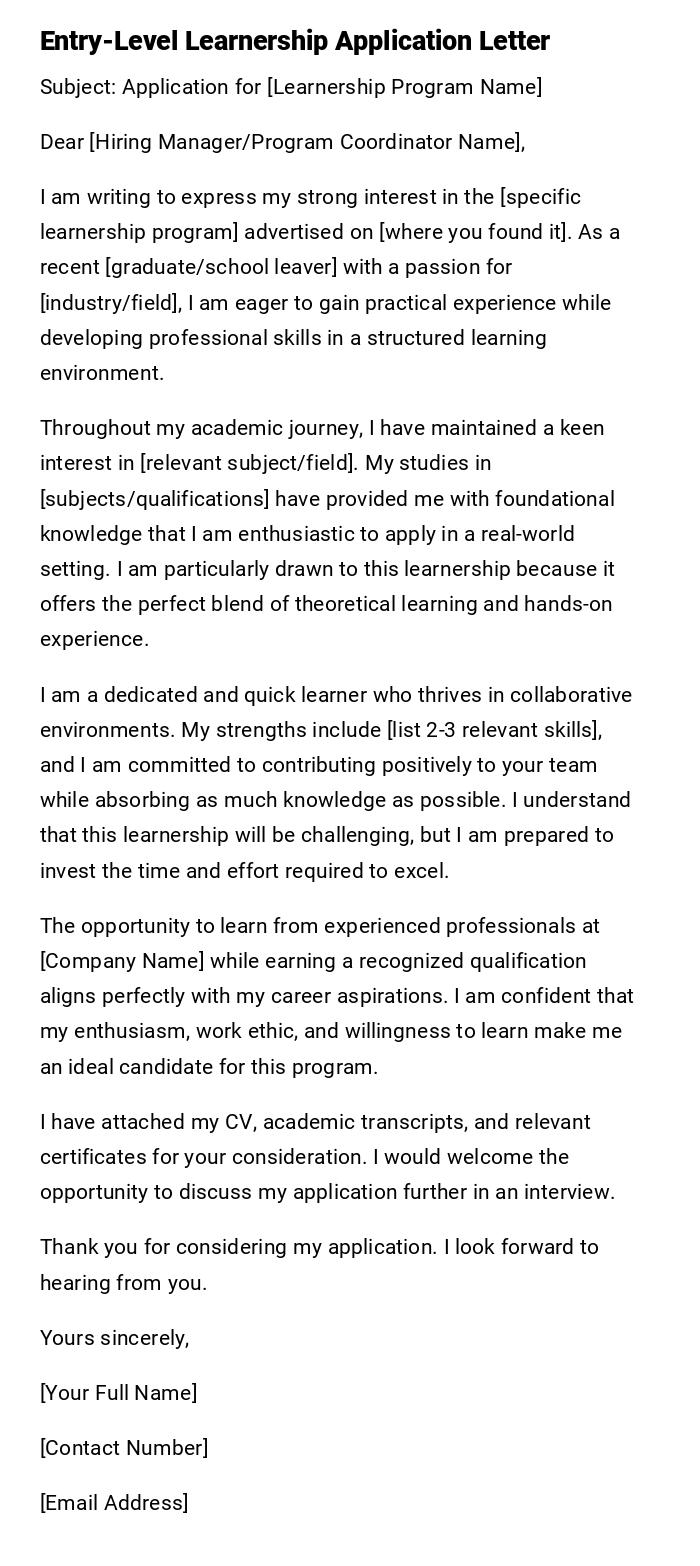
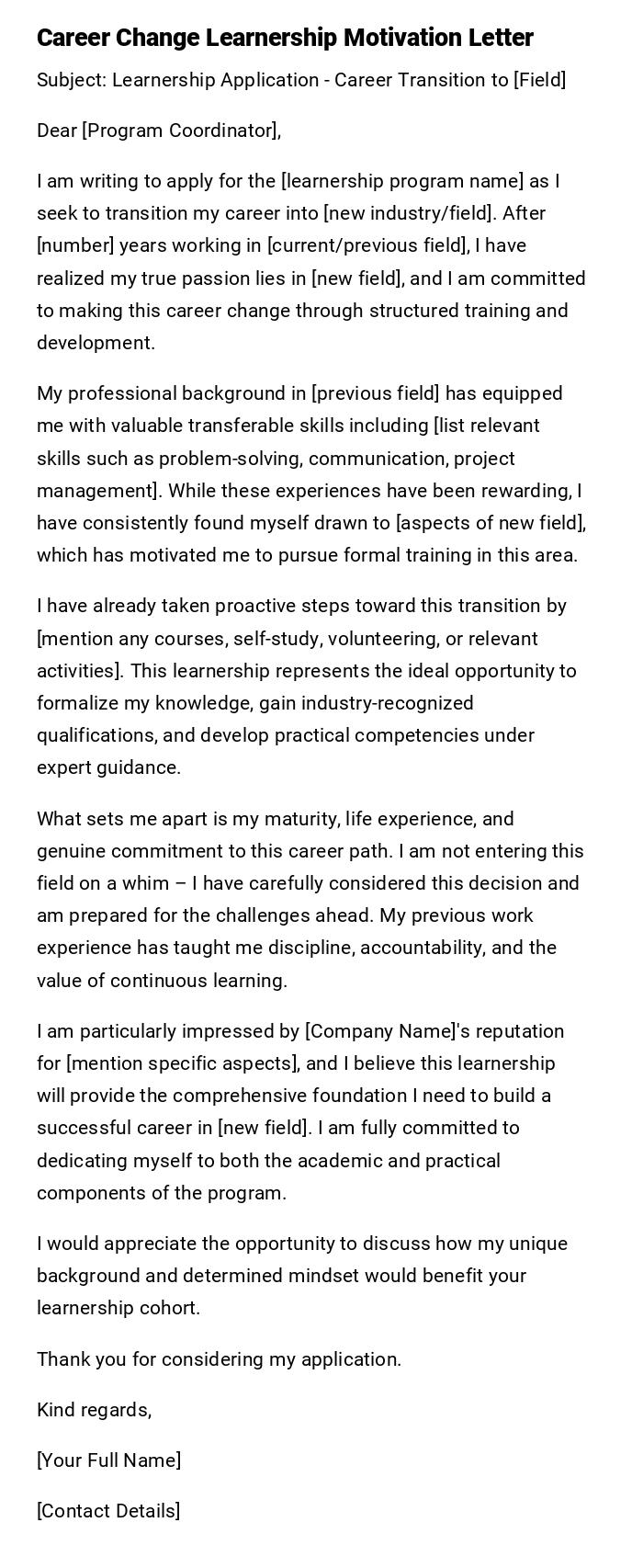
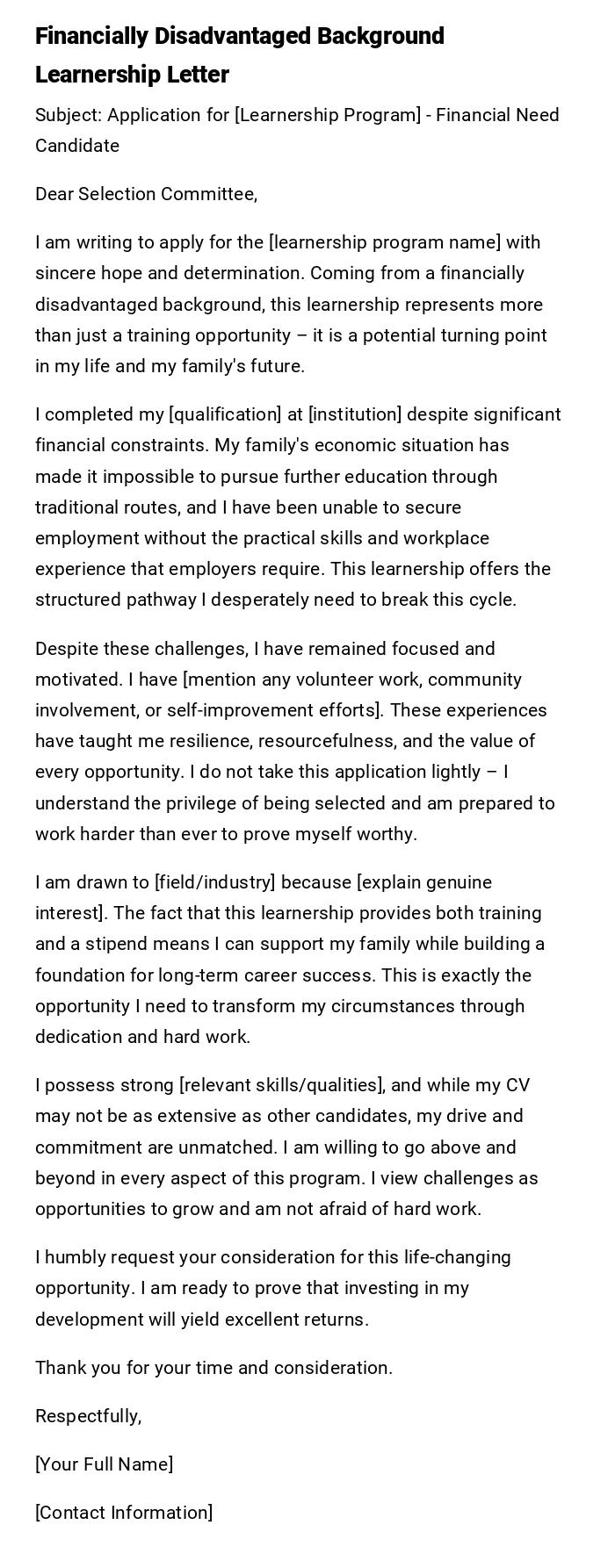
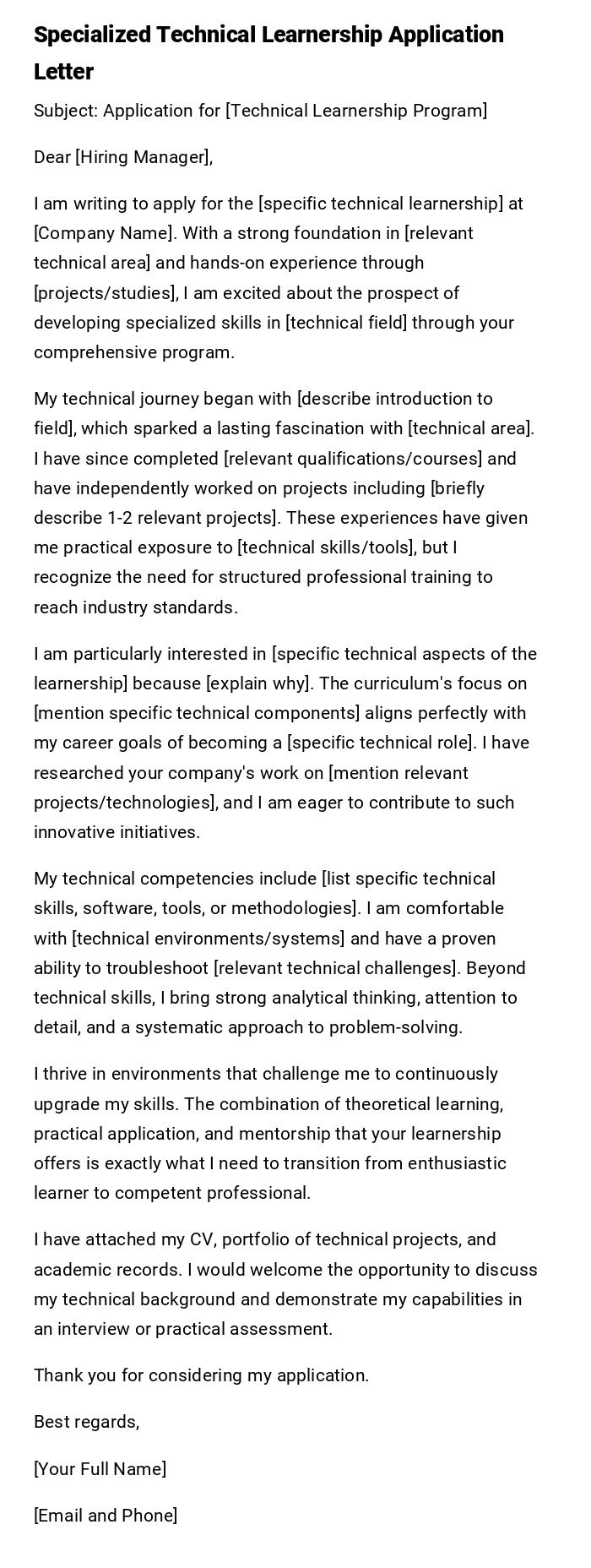
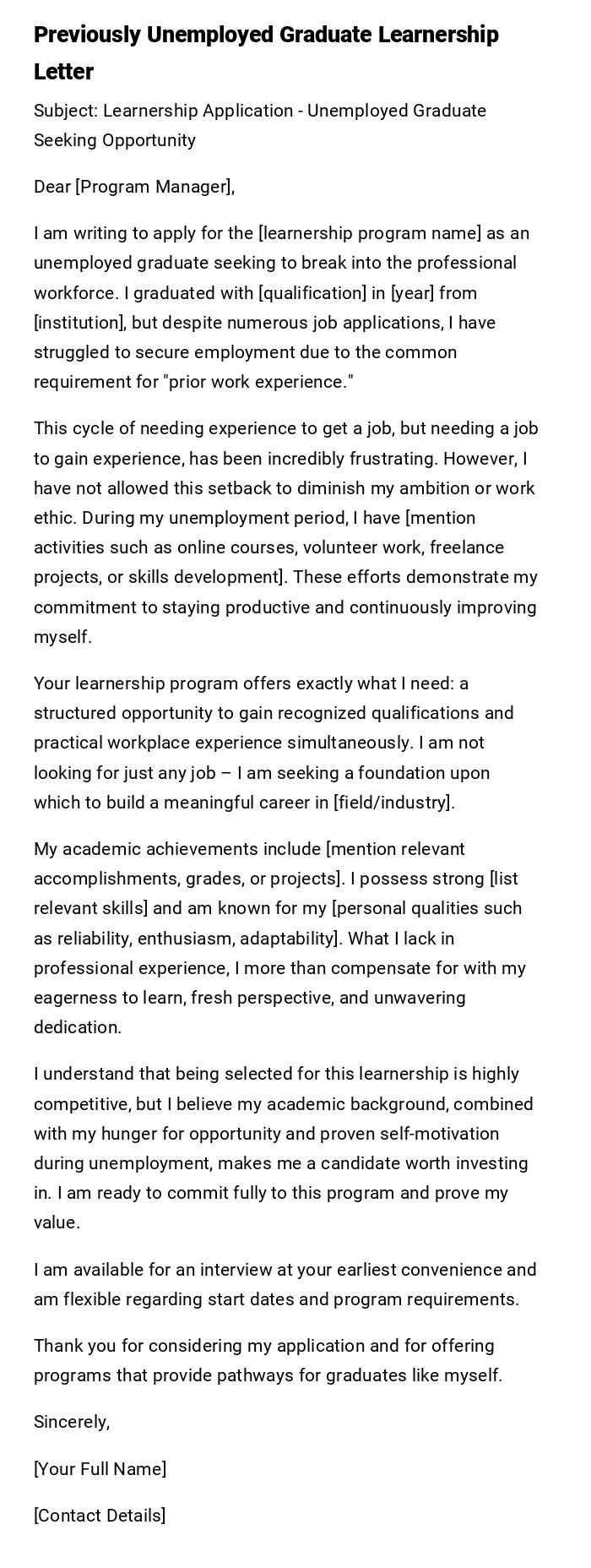
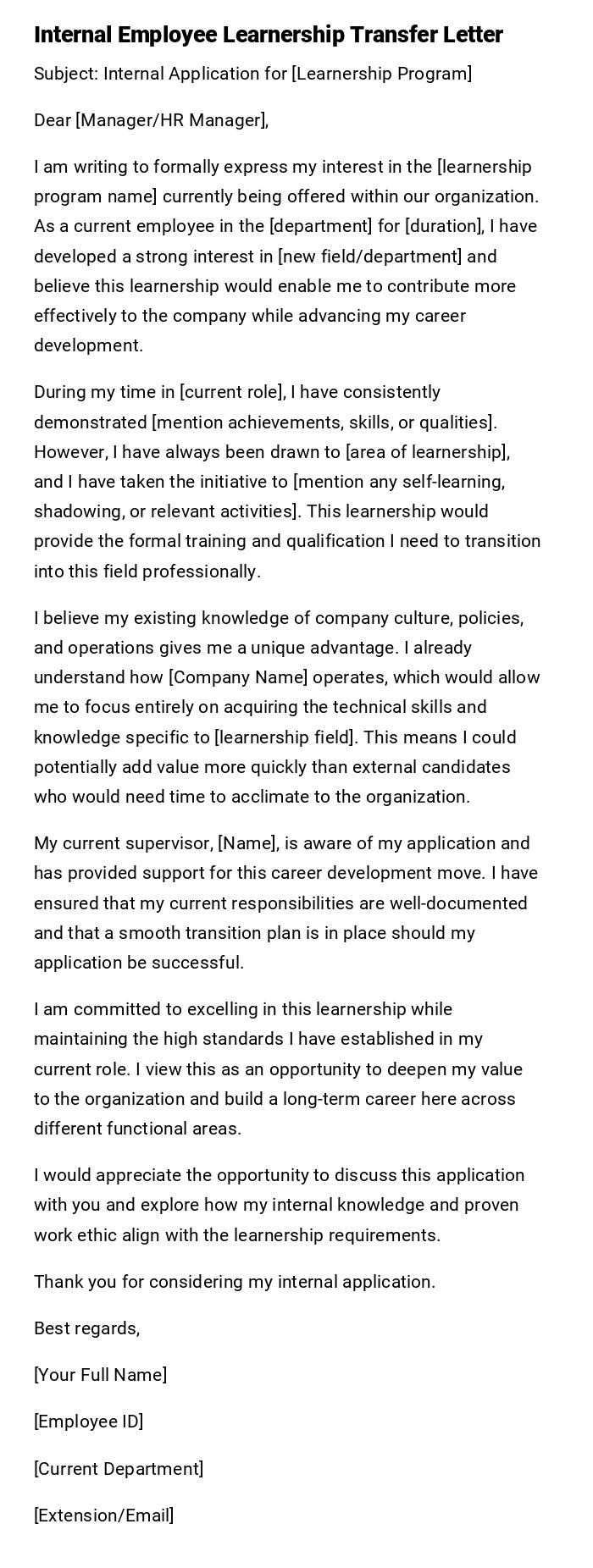
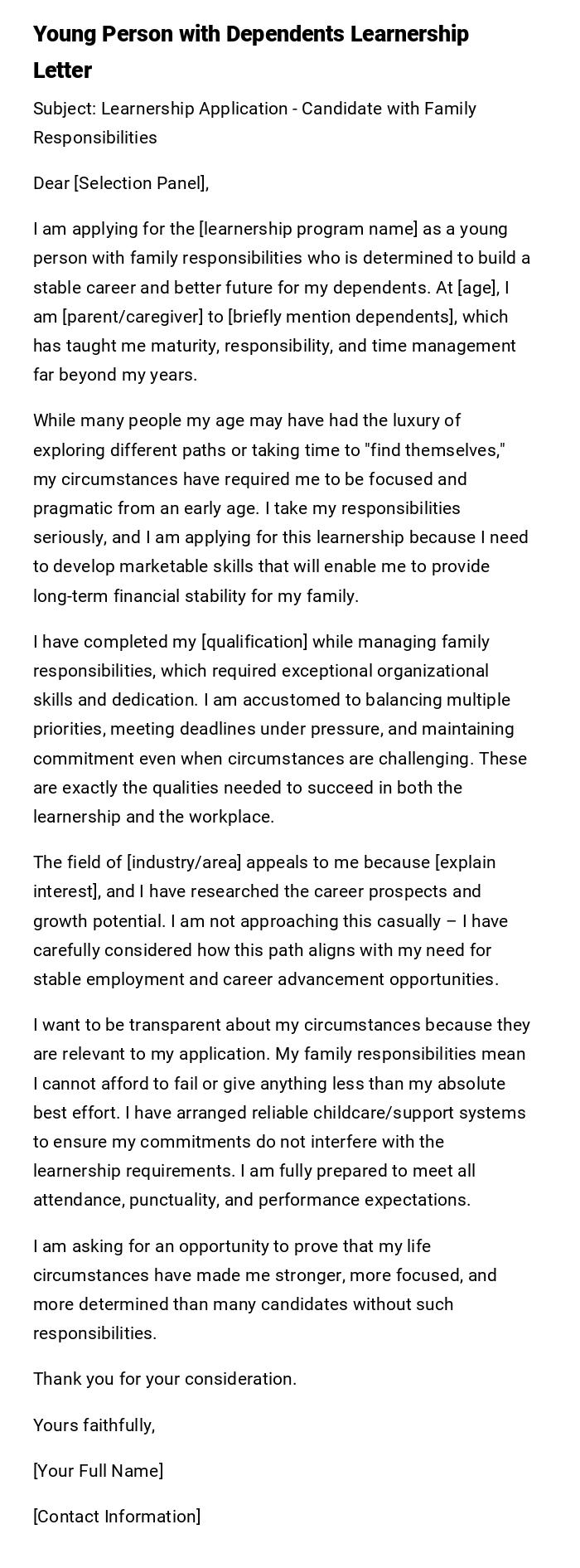

 Download Word Doc
Download Word Doc
 Download PDF
Download PDF